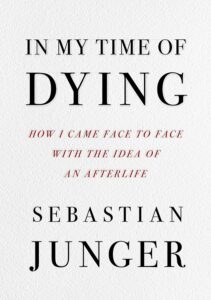In My Time of Dying is like Schrödinger’s cat. Until you open the book, author Sebastian Junger is both alive and dead. But in the famous quantum theory thought experiment, the quandary is resolved when you open the box with the cat in it. That doesn’t exactly happen with Junger’s memoir.

Trust me on this metaphor. It’s relevant on several levels, the least of which is that Junger says his teenaged great-aunt Ithi was the physicist Erwin Schrödinger’s mistress.
The story begins in June 2020. Junger has just spent a late-afternoon hour with his wife, Barbara, in Waldo Frank’s old writing cabin in the woods of their Truro property when a sharp pain shoots through his abdomen. It’s not a spoiler to say that the ruptured pancreatic aneurysm fails to kill Junger — his memoir, published this year, is proof of that.
But the near-death experience plays with the bounds of his reality like a mushroom trip where ego takes a tumble in the machine and emerges wrinkled and damp. “Sometimes I have to grip my head with my hands and tell myself not to start down that path,” Junger writes of an imagined parallel universe in which he actually died. “Sometimes it takes an effort to believe I didn’t die, and that what I’m experiencing is real.”
He makes that effort with his prose. Grounded in his tools as a journalist and guided by the empirical ethos instilled by his physicist father, Miguel, Junger merges personal reflection with quantum physics, history, religion, literature, and medicine. This allows him to explore the nuances of his altered state and abstracted cognition, and at moments he supersedes the rational plane to poke at the greater cosmic fabric he almost joined.
He orients us to this trip by recounting the evolution of the field of physics. He mentions Abraham Lincoln’s Gettysburg Address and the Book of Genesis to underscore the idea that there is no blessing without sacrifice. He suggests the sublime can be glimpsed by one good look at death, like Pip’s falling overboard into the warm sea in Moby-Dick before his unlikely rescue.
Junger’s charm — sharpened by decades of war reporting — is that he is a man undeterred by precipices. He has willingly and sometimes brazenly negotiated them: the tumult of surfing a January storm swell on the Outer Cape, a chainsaw miscalculation in tree surgery, a winter sojourn in the Sierra de Gredos south of Salamanca, Spain.
“I have the feeling that whatever I choose, I will make that same choice for the rest of my life,” he writes, recalling his 20-year-old self disappearing into the North African desert with Sahrawi camel traders. “If I gamble everything to find out what I don’t know, then I will always do that. If I turn back, I will always turn back. Is the unknown a place of mystery or terror? Am I sufficient unto myself or eternally indentured to my origins?”

In Junger’s rhetorical universe, the answer to these questions is not either/or but neither and both.
By choice and sheer luck — a phenomenon he has relied on frequently — Junger has retreated from the edge each time.
There is no explanation for why he returned from the war in Afghanistan when many of his friends and colleagues did not, or why Junger survived his aneurysm when his doctor initially thought he had a 50-50 chance of dying.
Junger describes these versions of his former self to let us know that seeking rupture, if not exactly comfortable for him, is what has always propelled him forward. It also anesthetizes any pity the reader might feel for him, and that seems intentional. The title of the book comes from a gospel song first recorded by Blind Willie Johnson, which Led Zeppelin and Bob Dylan both covered.
“In my time of dying/ Want nobody to mourn/ All I want for you to do/ Is take my body home,” the song begins. For Junger, “you” and “home” are vague. He’s not religious, but he can’t quite shake the spiritual quality of encountering that most infinite and inevitable of precipices and turning back.
In the confusion of the trauma bay at Cape Cod Hospital, as a doctor tries to get a Cordis catheter into his jugular vein, Junger’s dead father appears beside his gurney. He beckons to Junger, “statistically smeared like Schrödinger’s cat between a state of being and nonbeing, inviting me to join him in the beyond,” Junger writes.
That repulses Junger; then he blacks out. But the vision bears an uncanny resemblance to a dream he had the day before the aneurysm in which he floated above his wife and two young daughters, calling out to them but unheard as they held each other and wept.
“There is a theory that at every moment, all possibilities in our lives are followed, and that an almost infinite multiplicity of universes extends out from each of us eternally,” writes Junger.
Maybe, like his father, Junger is still statistically smeared across the cosmos. In My Time of Dying is its own invitation to the beyond, one to accept without expectation.



